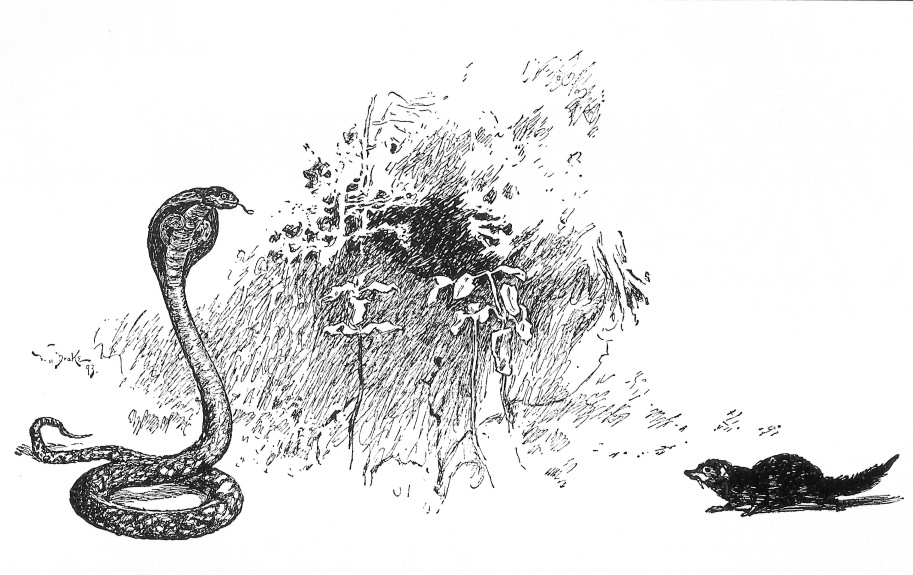Manthara reached home by evening. “My dear, my dear”, he called out as he walked through the door. Seeing her in the kitchen, he went to her and said “My dear, today I had the good fortune of seeing a Yaksha. He has promised to give me whatever I ask for. And so I rushed home to consult with you. I met my friend on the way, he said that I should ask for a kingdom. What do you think?

His wife replied “My dear, barbers are not intelligent, and that is why they spend their lives cutting hair. It is better not to listen to advice from them. And also, what kind of stupid advice did he give anyway? Taking care of a kingdom is a constant headache. One has to deal with countless problems, strategies, alliances, wars, deceit…a state of worry every day. What joy can becoming a king bring to you? It is said…”
यदैव राज्ये क्रियतेऽभिषेकस् तदैव याति व्यसनेषु बुद्धिः ।
घटा नृपाणाम् अभिषेक-काले सहाम्भसैवापदम् उद्गिरन्ति ॥ ६५ ॥
yadaiva rājye kriyate’bhiṣekas tadaiva yāti vyasaneṣu buddhiḥ |
ghaṭā nṛpāṇām abhiṣeka-kāle sahāmbhasaivāpadam udgiranti || 65 ||
The moment one is consecrated as the ruler of a kingdom, his mind gets filled with worry. The kalash (pot) that pours the sacred ganga jal on the head of the new king during consecration, also pours problems along with it.
रामस्य व्रजनं वने निवसनं पाण्डोः सुतानां वने वृष्णीनां निधनं नलस्य नृपते राज्यात् परिभ्रंशनम् ।
सौदासं तद्-अवस्थम् अर्जुन-वधं सञ्चिन्त्य लङ्केश्वरं दृष्ट्वा राज्य-कृते विडम्बन-गतं तस्मान् न तद् वाञ्छयेत् ॥ ६६ ॥
rāmasya vrajanaṃ vane nivasanaṃ pāṇḍoḥ sutānāṃ vane vṛṣṇīnāṃ nidhanaṃ nalasya nṛpate rājyāt paribhraṃśanam |
saudāsaṃ tad-avastham arjuna-vadhaṃ sañcintya laṅkeśvaraṃ dṛṣṭvā rājya-kṛte viḍambana-gataṃ tasmān na tad vāñchayet || 66 ||
Sri Rama had to live in a forest, the Pandavas too had to live in a forest, the Yādavas died, Nala was exiled, Soudāsa was cursed, KārtaVeerārjuna was killed by Parashurama, and the mighty Rāvana also had to die…all because they coveted a kingdom.
यद्-अर्थं भ्रातरः पुत्रा अपि वाञ्छन्ति ये निजाः ।
वधः राज्य-कृतां राज्ञां तद् राज्यं दूरतस् त्यजेत् ॥ ६७ ॥
yad-arthaṃ bhrātaraḥ putrā api vāñchanti ye nijāḥ |
vadhaḥ rājya-kṛtāṃ rājñāṃ tad rājyaṃ dūratas tyajet || 67 ||
Even blood brothers and sons can kill the king just because the covet the kingdom…and so it is better that one does not desire a kingdom, nor want to be the king.
Manthara heard the reasoning of his wife, and agreed. “You are right, my dear”, he said. ” I don’t think I should ask for a kingdom. So tell me, what should I ask instead?”
His wife replied “You make just one piece of cloth over one full week. The money that you make from selling it barely covers our expenses. If you ask for an extra head and another pair of hands, you can then make another loom, keep it behind you, and work on it as well. This way, you will be able to make two pieces of cloth in a week, and earn double of what you earn at present. One half we can keep to maintain the house, and the extra income we can use to buy what we want. The more things we have, the more people will respect us. We will live the rest of our lives happily, and will even be happy in the afterlife. “
Manthara jumped with joy. “Yes!”, he exclaimed. “What a clever suggestion! I agree…we can make double the amount of money, and become rich. I will go to the Yaksha first thing tomorrow, and ask for an extra head and an extra pair of hands!”
The next day, Manthara went to the Yaksha and requested him for an extra head and an extra pair of hands. “Tathāstu”, said the Yaksha, and the wish was granted. Manthara then thanked the Yaksha with both pairs of hands, and headed home.
He never reached. As soon as he entered the village, people saw his strange appearance – his two heads and four hands – and thought that he was a Rākshasa (demon). They all threw stones at him, beat him with sticks, and in a short while, Manthara and his potential productivity lay dead on the wayside.
“That is why” said VairāgyaKumar, “it is said that he who has no sense of his own, and does not heed the advice of his friends, dies like the weaver Manthara.
